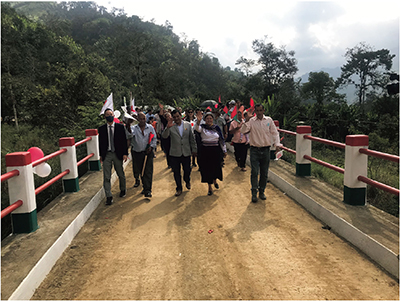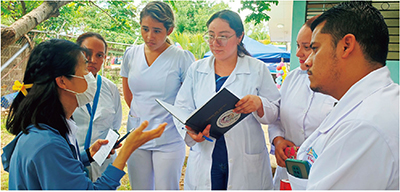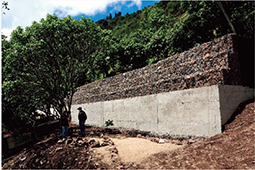4 Latin America and the Caribbean
As a major force in the international arena, Latin America and the Caribbean has an enormous emerging market with a population of approximately 660 millionNote 14 and a regional GDP of approximately 6.8 trillion US dollars.Note 15 Many countries in the region share fundamental values and principles with Japan, such as freedom, democracy, and the rule of law, and are strategically important from diplomatic and economic perspectives. Also, since the region is a supplier of minerals, energy, and food, and particularly given the current circumstances where food and energy supplies are seriously affected globally, it has become increasingly important in terms of strengthening supply chains and economic security in the international community including Japan. In addition, this region has the world’s largest Nikkei community (Japanese immigrants and their descendants) with a population of approximately 2.4 million, and there are also descendants who crossed the ocean to come to Japan and support Japanese industry. Thus, the personal and historic bond with Japan has been traditionally strong and this helps Japan maintain a stable and friendly relationship with the region for a long time.
On the other hand, the Latin American and the Caribbean region still has major developmental needs to be addressed as common challenges facing the international community, including climate change, disaster risk reduction, vulnerabilities in the areas of health and medical care, and poverty. There are also many countries in this region having vulnerabilities particular to small island states. In addition, the region is confronted by challenges, such as migrants who aim to immigrate to North America to flee from poverty and insecurity in their countries, Venezuelan refugees fleeing to neighboring countries due to the worsening political, economic, and social situations, and the situation in Haiti where the domestic political, economic, and security environments have continued to deteriorate since the murder of the president in July 2021.
Japan focuses on maintaining and strengthening friendly relations with the Latin American and the Caribbean region by providing assistance unique to Japan (such as “quality infrastructure,” disaster risk reduction and mitigation utilizing Japan’s experiences, clean energy technology, “Visible Japanese Development Cooperation” through technical cooperation by volunteers and others) in ways that consider each country’s income level, situations, and needs. Through such assistance, Japan strives to help the region realize resilient and sustainable development. Japan also supports and leverages the Nikkei people and their communities that form the foundation of strong ties with Japan, and will further strengthen its multi-layered network of human resources based on trust.
● Japan’s Efforts
In January 2023, then Foreign Minister Hayashi visited Mexico, Ecuador, Brazil, and Argentina, and reaffirmed that Japan will work to strengthen bilateral economic relations, cooperation, and exchanges with them. He also reaffirmed that, in view of the current severe situation facing the international community, Japan will work more closely with these countries in maintaining and strengthening a free and open international order based on the rule of law, as well as addressing important global issues such as climate change. Through these efforts, Japan strives to further cultivate its relations with the Latin American and the Caribbean region.
■ Efforts toward Disaster Risk Reduction and Environmental Issues

Local residents crossing a bridge built through the Grant Assistance for Grass-Roots Human Security Project in Bolivar Province, Ecuador
While the Latin American and the Caribbean region is blessed with abundant nature, the region is prone to natural disasters such as earthquakes, tsunamis, hurricanes, and volcanic eruptions. Therefore, it is of great importance that Japan supports this region with its knowledge and experience in the field of disaster risk reduction.
Japan provides assistance utilizing its expertise in the disaster risk reduction to the Latin American countries facing the Pacific Ocean, such as Ecuador, Mexico, and Peru, where earthquakes frequently strike. Japan also provided emergency relief goods through JICA to Chile, which was affected by forest fires in 2023. For Caribbean countries, Japan delivers various assistance and helps them overcome the particular vulnerability of small island countries to natural disasters. In recent years, Japan has been dispatching experts in disaster risk reduction to the Caribbean Disaster Emergency Response Agency (CDEMA) and helping enhance the capacity for formulating disaster risk reduction policies in the region (see “Featured Project” regarding disaster risk reduction assistance in Honduras).
Moreover, Japan is engaged in a wide range of cooperation in the efforts to address environmental issues in the region, including scientific and technological research on climate phenomena, the conservation of biodiversity, and the protection of the Amazon rainforest using remote sensing. In recent years, the influx of large amounts of Sargassum seaweed has become a serious issue in the Caribbean region. In view of the situation, in 2022, Japan decided to provide Saint Christopher and Nevis, Saint Vincent, Saint Lucia, Trinidad and Tobago, and Barbados with grant aid of approximately 1.4 billion yen to remove Sargassum seaweed through the United Nations Development Programme (UNDP). Furthermore, in 2023, as part of the effort to respond to the same issue, Japan decided to provide the Dominican Republic with grant aid for the purchase of equipment made by Japanese companies (beach cleaners, dump trucks, etc.).
■ Economic and Social Infrastructure Development
In order to promote economic and social infrastructure development of the Latin American and the Caribbean region, Japan actively engages in developing water supply and sewerage infrastructure in metropolitan regions and the countryside. In September 2023, Japan decided to provide Paraguay with grant aid for the purchase of equipment to major vocational training schools and help break away from its agriculture-dependent economy and pursue industrial diversification. In addition, Japan works on spreading its terrestrial digital broadcasting system (ISDB-T)Note 16 through public-private collaboration. As of December 2023, 14 countries in Latin America and the Caribbean adopted the Japanese system. For these countries, Japan supports technical transfer and human resources development to achieve smooth introduction of the system (see Part III, Section 1 (2) regarding support for the introduction of the Japanese system).
■ Initiatives in the Areas of Health and Medical Care, and Education

A Japanese expert providing guidance on screening for non-communicable diseases (NCDs) in Juigalpa City, Nicaragua (Photo: JICA)
Due to the underdeveloped medical system, non-communicable diseases, infectious diseases such as HIV/AIDS and tuberculosis, and tropical diseases are still serious public health concerns for the Latin American and the Caribbean region. Therefore, establishing a system enabling rapid and accurate diagnosis and treatment is needed.
In Bolivia, improving medical equipment was a particularly urgent issue. In June 2023, Japan decided to provide Bolivia with grant aid of 300 million yen and has installed medical equipment utilizing its advanced medical technology in the country’s national medical institutions.
Japan makes continuous effort for the Nikkei communities in various countries in Latin America and the Caribbean, such as providing support for the welfare facilities of the Nikkei communities, accepting trainees, and dispatching JOCVs (see Part V, Section 1 (6) for collaboration between the Nikkei community in Latin America and the Caribbean and Japan, and “Featured Project” for support for young Nikkei people in Bolivia).
Assistance in the sector of education is extremely important for Latin American and the Caribbean countries, where poverty still persists and education is under-budgeted. Based on the idea that education is crucial as an “investment in people,” Japan has continuously provided El Salvador with technical cooperation in mathematics and arithmetic education since 2021.
■ Assistance for Central American Migrants and Venezuelan Refugees and Migrants
The Central American region faces the problem of migrants who seek to immigrate to the United States and Mexico, fleeing poverty and insecurity in their country. Japan provides support for the measures to address the root causes of their migration such as poverty, insecurity, and disasters. Moreover, in cooperation with the International Organization for Migration (IOM) and the World Food Programme (WFP), Japan provides El Salvador, Guatemala, Honduras, and Mexico with assistance for the promotion of voluntary repatriation of migrants, prevention of outflow of migrants, and social reintegration of returnees.
Due to the deterioration of the economic and social conditions in Venezuela, approximately 7.72 million refugees and migrants have flowed mainly to neighboring countries as of September 2023. This has caused the deterioration in the living conditions of the host community residents and the instability of the region, and the lack of adequate response has been a challenge. In February 2023, Japan announced its decision to provide Brazil and Peru, which host displaced persons from Venezuela, with assistance through the United Nations High Commissioner for Refugees (UNHCR), with the aim of supporting social integration, including protection and vocational training for the vulnerable people. In September, in light of the deteriorating humanitarian situation in Venezuela, Japan provided food assistance through WFP. Additionally, in October, Japan decided to provide humanitarian assistance through IOM, such as protection activities and the development of shelter for women and youth in the most vulnerable situations, as well as enhancement of access to information and support to local communities, humanitarian organizations, and other entities.
■ Support for Haiti in Response to its Worsening Security Situation
In Haiti, especially since 2021, there have been increases in violence and kidnappings against civilians by armed groups, which have become more influential. Nevertheless, the Haitian National Police (HNP), which should play a central role in improving security in the country, is short of both personnel and equipment. In view of this situation, the dispatch of the Multinational Security Support (MSS) Mission to Haiti was decided at the United Nations in October 2023, and Japan supported this decision.
Japan assists in stabilizing the security, economy, and society in Haiti, while working with the U.S. and other member countries of G7, the Organization of American States (OAS), and the Caribbean Community (CARICOM). Furthermore, in response to the decision to dispatch the MSS Mission, Japan has decided to provide additional support of approximately 2 billion yen to contribute to the MSS Mission through capacity building and other efforts for the HNP.
■ South-South Cooperation
Argentina, Brazil, Chile, and Mexico are building a strong track record in South-South cooperation.Glossary With these countries, Japan has developed partnership programs on triangular cooperation.Glossary Based on such partnerships, Japan collaborated with Argentina in 2023, for example, to provide assistance to small and medium-sized enterprises (SMEs) in Latin America and the Caribbean. In addition, Japan cooperated with Mexico in introducing production systems for non-traditional tropical fruits in northern countries of Central America. In Chile, Japan implements human resources development programs through triangular cooperation in the field of disaster risk reduction. Furthermore, in 2023, Japan held an online seminar on floods and landslides for Latin American and the Caribbean countries. In Brazil, many years of cooperation from Japan resulted in the widespread use of the Japanese-style community police system. Building on this experience and the framework of triangular cooperation, Brazilian experts are currently dispatched to Central American countries to pass on their know-how in the field of community policing.
In order to provide more effective and efficient assistance, Japan works with regional organizations such as the Central American Integration System (SICA) and the CARICOM to formulate regional projects related to common development issues in the Latin American and the Caribbean region.
Featured Project 8
Honduras
Aiming to Reduce the Risk of Natural Disasters
Project for Control and Mitigation of Landslide in Tegucigalpa Metropolitan Area
Technical Cooperation (February 2019 – December 2022)
In Honduras, frequent natural disasters such as hurricanes are obstacles to sustainable development. Tegucigalpa Municipality, the capital of Honduras, is a city developed in a basin that is prone to landslides and floods caused by rainfall.
As the capital’s population grows, so does the demand for housing, even in areas with high disaster risk. Taking disaster risk reduction measures, including those for landslides, is a major issue. However, since the administration did not have adequate information gathering and analysis methods or systems for the management and usage of land, land risk assessments were not conducted appropriately.
After a huge hurricane struck the capital and caused severe flood damage in 1998, Japan started contributing to the risk reduction of landslide disasters in Tegucigalpa, such as by constructing landslide prevention facilities, through grant aid.
In this project, to make the past cooperation even more effective, Japan provided support through technical cooperation to Tegucigalpa City and other organizations to enhance their capacity to respond to landslides. Specifically, Japan provided technical assistance by utilizing Japanese knowledge and experience in landslide risk assessment, designing, constructing, and maintaining countermeasures, developing checklists for measuring the hazard level of slopes, and making hazard maps. Tegucigalpa City highly praised the success of this project and secured its own budget to design and construct new countermeasures by utilizing technology transferred from Japan. Japan’s assistance has developed into an autonomous initiative on the part of Honduras.
Japan will continue to support the disaster risk reduction efforts of developing countries, utilizing its knowledge and experience, toward the realization of sustainable development.

Rockfall retaining wall constructed through the “Project for Control and Mitigation of Landslide”
Glossary
- South-South cooperation / Triangular cooperation
- South-South cooperation refers to cooperation provided by relatively advanced developing countries to other developing countries, utilizing their own development experiences, human resources, skills, funds, and knowledge. In many cases, the cooperation, primarily technical cooperation, takes place in countries that have similarities in terms of natural environments, linguistic, cultural, and economic backgrounds, and development processes. When supported by developed countries, donors, or international organizations, such South-South cooperation between developing countries is referred to as “triangular cooperation.”
- Note 14: World Bank website (as of December 2023)
https://data.worldbank.org/indicator/SP.POP.TOTL?end=2022&locations=ZJ&start=1989 - Note 15: World Bank website (as of December 2023)
https://data.worldbank.org/indicator/NY.GDP.MKTP.CD?end=2022&locations=ZJ&start=1989 - Note 16: See Note 19.
